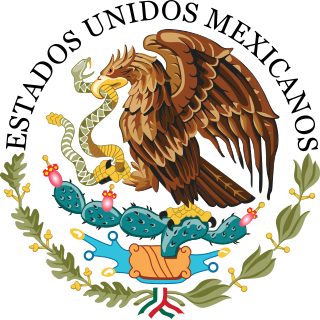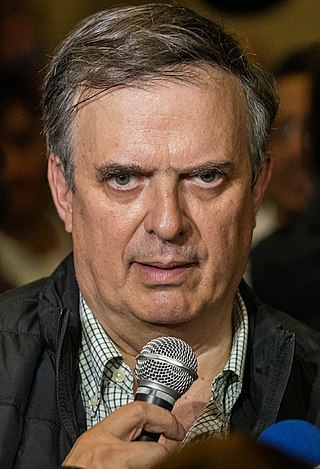
The politics of Mexico function within the framework of a federal presidential representative democratic republic whose government is based on a multi-party congressional system, where the President of Mexico is both head of state and head of government. The federal government represents the United Mexican States. It is divided into three branches: executive, legislative, and judicial, established by the Political Constitution of the United Mexican States, published in 1917. The constituent states of the federation must also have a republican government based on a congressional system established by their respective constitutions.

The Party of the Democratic Revolution is a state-level social democratic political party in Mexico. The PRD originated from the Democratic Current, a political faction formed in 1986 from the Institutional Revolutionary Party (PRI). The PRD was formed after the contested general election in 1988, which the PRD's immediate predecessor, the National Democratic Front, believed was rigged by the PRI. This sparked a movement away from the PRI's authoritarian rule.

Andrés Manuel López Obrador, also known by his initials AMLO, is a Mexican former politician who served as the 65th president of Mexico from 2018 to 2024. He previously served as Head of Government of Mexico City from 2000 to 2005.

The Labor Party is a political party in Mexico. It was founded on 8 December 1990. The party is currently led by Alberto Anaya.

Citizens' Movement is a Mexican centre-left political party. The party was founded in 1999, under the name Convergence for Democracy, which was then shortened to Convergence in 2002 and changed to Citizens' Movement in 2011.

General elections were held in Mexico on Sunday, 2 July 2006. Voters went to the polls to elect a new President of the Republic to serve a six-year term, replacing then President Vicente Fox ; 500 members of the Chamber of Deputies to serve for three-year terms; and 128 members of the Senate to serve for six-year terms.

Marcelo Luis Ebrard Casaubón is a Mexican politician who has served as the secretary of economy since 2024. He previously served as Secretary of Foreign Affairs under President Andrés Manuel López Obrador from 2018 to 2023. He served as Head of Government of the Federal District from 2006 to 2012.
Demetrio Javier Sodi de la Tijera is a Mexican journalist, businessman and politician who has served in the upper and lower houses of the Congress of the Union, and as head of Miguel Hidalgo borough from 2009 to 2012. In 2006, he unsuccessfully ran as the National Action Party (PAN) candidate for the Head of Government of the Federal District. A member of the Sodi family, he is the cousin of the actress and singer Thalía.

Jesús Ortega Martínez is a Mexican centre-left politician affiliated with the Party of the Democratic Revolution (PRD). He has served in the lower and upper house of the Mexican Congress. He was elected president of the PRD in 2008. He served as president until he was succeeded by Jesús Zambrano Grijalva in 2011.

The Mexican general election of July 2, 2006, was the most hotly contested election in Mexican history and as such, the results were controversial. According to the Federal Electoral Institute (IFE), the initial "Quick Count" determined the race was too close to call, and when the "Official Count" was complete, Felipe Calderón of the right-of-center National Action Party (PAN) had won by a difference of 243,934 votes. The runner-up, Andrés Manuel López Obrador of the left-of-center Coalition for the Good of All, immediately challenged the results and led massive marches, protests, and acts of civil resistance in Mexico City. On August 9, while protests continued to expand, a partial recount was undertaken by election officials after being ordered to do so by the country's Federal Electoral Tribunal. The tribunal ordered the recount of the polling stations that were ruled to have evidence of irregularities, which were about nine percent of the total.

Pablo Gómez Álvarez is a Mexican politician. He was the president of the Party of the Democratic Revolution (PRD) and has served in both houses of Congress. On 8 November 2021 he was appointed to head the Unidad de Inteligencia Financiera, the country's financial intelligence unit.

The Coalition for the Good of All was a left-wing coalition created by the Party of the Democratic Revolution (PRD), Convergence and the Labor Party (PT) to support Andrés Manuel López Obrador as a candidate for the presidency of Mexico in the general election of 2006. The coalition also presented joint candidates for Congressional and local elections.

General elections were held in Mexico on Sunday, 1 July 2012. Voters went to the polls to elect a new President of the Republic to serve a six-year term, replacing Felipe Calderón, 500 members of the Chamber of Deputies and 128 members of the Mexican Senate.

Miguel Ángel Mancera Espinosa is a Mexican lawyer and politician who works with the Party of the Democratic Revolution (PRD).[A] He served as the Mayor of Mexico City from 2012 to 2018. Mancera graduated from the Faculty of Law of the National Autonomous University of Mexico (UNAM) in 1989, and he was awarded the Gabino Barreda Medal two years later for being the best student of his class. He has a master's degree from the University of Barcelona and the Metropolitan Autonomous University and a Juris Doctor from the UNAM.

Adán Augusto López Hernández is a Mexican politician, lawyer and notary public who currently serves as a Senator of the Republic and President of the Political Coordination Board (JUCOPO) in the Mexican Senate, a role he assumed on September 1, 2024. He previously served as governor of Tabasco from January 2019 until August 2021, date on which he was appointed Secretary of the Interior by President Andrés Manuel López Obrador. López Hernández is a founding member of the political party MORENA and has formerly held office as senator and congressman in the Tabasco State Congress (2007-2009), the LXI Legislature of the Federal Chamber of Deputies (2009-2012) and the Senate in its LXIV Legislature (2012-2018).
The National Regeneration Movement, commonly referred to by its syllabic abbreviation Morena, is a major left-wing populist political party in Mexico. As of 2023, it is the largest political party in Mexico by number of members; it has been the ruling party since 2018, and won a second term in the 2024 general election.

Ifigenia Martha Martínez y Hernández was a Mexican economist, diplomat, and politician who served as the president of the Chamber of Deputies in 2024.

Social Encounter Party was a Mexican conservative political party established on the national level in 2014 and dissolved in 2018. It was part of the coalition Juntos Haremos Historia with the National Regeneration Movement and Mexico's Labor Party for the 2018 Mexican election.

Legislative elections were held in Mexico on 6 June 2021. Voters elected 500 deputies to sit in the Chamber of Deputies for the 65th Congress. These elections took place concurrently with the country's state elections.

The 2021 Mexican local elections, held on June 6, 2021, saw voters electing fifteen governors for six-year terms, deputies for thirty state congresses, and officials for 1,910 municipalities. These elections took place concurrently with the country's federal legislative election. The elections, alongside the federal legislative election, were one of the most violent in the country's history, with 91 candidates assassinated prior to election day.























